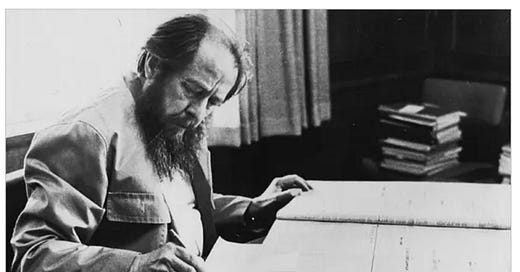Solzhenitsyn and Ukrainian independence
In our last ep Evgenia and I talked about a recent stream of articles that try to problematize previously celebrated Russian and Soviet authors and poets for their Russian imperialism and chauvinistic views on Ukraine. In pretty much every instance Aleksandr Solzhenitsyn has been one of the main targets. See here and here.
I know Solzhy’s a big Russian Orthodox Slavophile and a softy for the Russian monarchy who loved blaming the Jews for communism and the revolution. So accusations that he was a Russian imperialist who had denied Ukrainian national autonomy and identity didn’t really surprise me. Still, the two articles I mentioned above didn’t directly quote anything he wrote on the subject. That made me suspicious.
Consulting a list of popular Jewish names?
Curious about his actual positions, I read around a bit to see what he had said or written about the Ukrainian Question. And I was surprised to find he was actually a lot more reasonable that I expected — well, reasonable in his own messianic pan-Slavic precious bodily fluids, anti-communist women-need-to-stay-at-home-to-birth-babies Russian Orthodox kind of way. Aside from all that — and aside form his dream of creating a nation for the Slavs — apparently he was open to the existence of an independent Ukraine.
For instance, in collection of essays published in the 1990s, Solzhenitsyn writes that he’s against going to war with Ukraine — and that if there ever was a war he wouldn’t fight in it and wouldn’t allow his sons to fight in it either:
The Ukrainian question is one of the most dangerous questions of our future. It can inflict a bloody blow on us at the very moment of liberation — and minds on both sides are ill-prepared for it. I feel the burden of this question all the time… I sincerely wish the Ukrainians happiness, and I would like us to work together with them and not in enmity to properly resolve this accursed issue. I would like to bring reconciliation to this dangerous split.
And also: I was friends with Western Ukrainians in the Ekibastuz Special Camp. I know their intransigence and I respect how courageously it was shown there. In the union against the Soviet power, I felt no gap between us. I think there are still many of my camp friends in Ukraine and this will facilitate future conversation. It will not be any easier to talk about this with the Russians.
As it is useless for Ukrainians to prove that we all hail from Kiev, as it is for the Russians to deny that the people on the other side of the Dnieper are different. A lot of resentment and strife was sown by the Bolsheviks: as everywhere and everywhere, these murderers only trampled and tormented old wounds. And when they leave, they leave us rotting.
…In any case, I know firmly: If there is a Russian-Ukrainian war, God forbid — I will not go to it myself and I will not let my sons fight.”
He wrote a similar thing in a rambling religio-nationalistic essay titled “How To Rebuild Russia” — published in Komsomolskaya Pravda in 1990, right before Yeltsin and Kravchuk undemocratically plotted to separate the Russia and Ukraine from the Soviet Union.
In that essay — which has long been controversial among some of his fans for saying that Kazakhstan should be partitioned and that non-Slavic republics are a drain on the Russian people — he wrote that he believed that the Soviet Union’s Slavic people should exist in one unified nation — a nation that includes Ukraine, Belarus, Russia, and parts of Kazakhstan and no other Soviet republics. At the same time he wrote that he ultimately would support Ukraine’s democratic choice of whether or not to stay in a union with Russia, and he specifically says that Ukraine should not be forced to stay. But then he goes bigger: He writes that if Ukraine has the right to self-determination so should other regions within Ukraine. I’m guessing he had “Russian” parts of Ukraine in mind — Kharkov, Odessa, the Donbass? Or maybe he was thinking of the ethnic Hungarian parts of Ukraine that wouldn’t mind joining up with Hungary?
Anyway, here’s a small translated bit from the essay:



